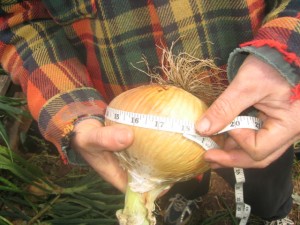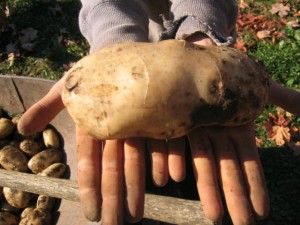Feed the Soil – not the plants
by Les Oke
When most people get started with gardening they are usually driven by an urge to follow the conventional wisdom shown on TV or shown in most garden centers.
We are bombarded with ads for this and that miracle fertilizer which will make your plants grow.
The truth is that these plant foods do produce a flurry of growth and really do make your plants ‘look’ good at the start. But, like anything that promises more than it delivers this miracle of growth is short lived.
Instead of adopting this short term ‘feed the plant’ mentality get started on the right foot and begin your garden by feeding the soil. This is certainly a more long term approach and you will definitely not see miracle results the first few weeks.
The best part of this feeding the soil approach is that, although your garden plants will not start off with a flush of green, they will finish well when it counts.
Producing more tomatoes, healthier and tastier green vegetables, in almost every way the feed the soil approach is better for you and your family.
Fertilizer companies are driven by a profit motive, no surprise there, and using a short term feed the plant approach ensures that you will need their products next month, and next year, thus they sell more product.
It’s easy, and the results look good, but there is a better way.
How do you feed the soil?
Most likely you have the tools and material already at hand, and available help ready as well.
For simple value and rewards compost is the ticket to a healthy garden, and added manure from local farms will give your garden an even greater boost.
But, let’s start off with a product you might not even consider as a garden compost material- lawn clippings. Especially in the spring when your lawn grows at a fast rate cut grass when raked up and composted can provide a great soil enhancement.
You can even spread it between your rows of vegetables as mulch. It will gradually decay and all of the worms and micro-organisms in your soil will break it down into a usable form for your garden plants.
Making compost is simply a matter of making a pile (it does not even have to be in a container). Alternate layers of course material like lawn clippings, straw and such items with kitchen scraps and the odd shovel full of garden soil. It will gradually decay into the finest of garden food, and you can spread it on your garden each spring, or fall.
For the adventurous travel to the country and stop in at a farm or two, preferably a horse farm. Ask the owners if you can have a couple pails of old horse manure.
Look for the oldest pile, it will have very dark soil under and around it and the manure will not look like straw at all, but more like crumbly loose garden soil.
In our garden, and yours this stuff is like gold. It does not smell and can be easily transported back home even in the trunk of your car.
Every trip to town past the farm you can grab a few pails.
Start off by using it for part of your potting soil mix in the spring, or if you have enough spread it in the area of your garden before you plant.
Be careful not to use chicken (or any bird) manure as it is usually too high in nitrogen and will burn.
Yes, it is a bit more work in the beginning, but it usually does not cost as much in the long run as the miracle solutions you spread around each year.
Your soil will continue to grow over the years and you will notice that every year your crops will improve in both taste and nutrition as well as their ability to combat disease and pests.
Long term nothing beats the feed the soil approach.
Make Gardening Easy!
Now, you can enjoy all the benefits of fresh food for many months of the year, without all that digging and weeding!
Learn to grow your own super fresh produce, take some of the strain off of your grocery budget and enjoy quiet time in your garden!
Try Gardening Secrets today and get better results from your garden with less work! Learn more here.





If you keep your garden mulched and give it an occasional good soaking (depending on your climate) then the worms come. The more worms, the better the soil. I do not use fertiliser and my garden is thriving.